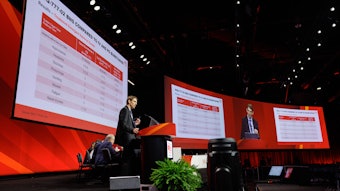Wake-up call: Heeding global risk factors
AHA President Keith Churchwell challenges health care professionals to work toward a better world for everyone, everywhere, during the AHA's next century.

The past 100 years have seen incredible progress in cardiovascular medicine. Heart care protocols and guidelines have advanced patient care, new therapies have improved outcomes for acute cardiovascular events and age-standardized mortality rates from cardiovascular disease have declined almost 35% globally since 1999. Yet the burden from cardiovascular disease has continued to grow, said AHA President Keith Churchwell during yesterday’s Presidential Session.
Churchwell, who delivered the Lewis A. Conner Lecture, outlined a century of improvements in health care but was quick to point out that an incredible amount of work stands to be done.
“As a physician, my life’s work has been a part of the dramatic change in how we care for patients,” he said, “but we are at an inflection point on what we can and need to do to achieve the best care for everyone.” When Churchwell began his career, most U.S. cardiologists were in private practice and, as recently as 2007, still
were. However, by 2023, with the pandemic playing a central role as a reason for practice acquisition, almost 80% of cardiologists were employed by hospitals and other corporate entities, he said. This profound change has contributed to the expansion of care and growth of health systems, including the creation of service lines in hospitals.
“You can find ‘heart centers’ from Mumbai to Stockholm to Indianapolis, with hospitals and institutes that treat and evaluate cardiovascular disorders, conduct research and strive to continually innovate,” Churchwell said. “This shift has been fascinating to witness and to be a part of,” he said. However, there is no time to linger on past accomplishments when so much potential for progress lies ahead. 
A presidential advisory published this year in Circulation shows that if we continue on our present path, then many key clinical disease metrics will surge in the wrong direction by 2050,” Churchwell warned, citing a 2023 World Obesity Atlas report that estimates by 2035, the number of people who will be clinically defined as overweight will top four billion. The associated economic annual financial cost for that — if unchecked by 2050 — will top $1.8 trillion in the U.S. alone.
“These statistics on global risk factors and recent advisories should be a wake-up call for all of us,” he said. “First, we must find more ways to aggressively treat hypertension, treat hyperlipidemia with therapies that we know work and continue pursuing new and innovative treatments. Next, with our partners in government, industry and communities, we must find ways to improve the social drivers of health. Access to care is a universal problem.”
Finally, Churchwell said the working environment for clinicians, scientists and nurses must be enhanced to increase efficiency so that these health care workers can feel that their work is fulfilling.
“We are facing a crisis,” he said. “While a sense of urgency always looms over medical care, it feels as if the clock is ticking a bit faster — and louder.
“None of us is expected to have all the solutions. But I’ve learned that each of us can do something — and together, we can play parts large and small to make a difference. And not only can we, we must.”











